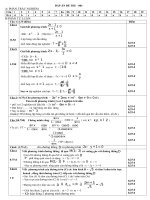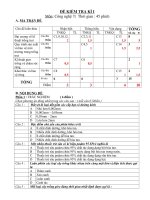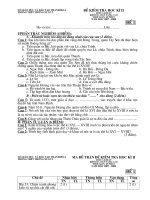Đáp án nói 2 ehou EN23.078
Bạn đang xem bản rút gọn của tài liệu. Xem và tải ngay bản đầy đủ của tài liệu tại đây (73.62 KB, 7 trang )
ĐÁP ÁN NÓI 2 EHOU
Question
Answer
Explain
Complete the conversation Thank you, I’m glad to Váy của chị đẹp tuyệt. –
by selecting the most hear that
Cảm ơn, tơi rất vui vì điều
appropriate response:
đó
Your
dress
is
just
wonderful.
Complete the conversation It will be open until 6 pm
by selecting the most
appropriate response:
Ngân hàng sẽ mở đến khi
nào? đến 6 giờ.
How late will the bank be
open?
What do you say when If you have any question, Để mời mọi người đặt câu
you want to invite please don’t hesitate to hỏi Nếu anh chị có câu hỏi
questions?
interrupt me.
nào, hãy cứ mạnh dạn ngắt
lời tôi nhé.
Chọn một câu trả lời:
Complete the conversation I’m sorry to hear that
Mẹ tôi đang ốm nằm viện.
by selecting the most
– Tơi rất tiếc khi biết điều
appropriate response:
đó.
My mother is ill in
hospital.
Choose one word whose downstairs
the stress placement is
different from others
Chọn một câu trả lời:
Complete the conversation Not at all
by selecting the most
appropriate response:
Excuse me, which is the
way to the post office? –
Sorry, I’m new here. ………
Choose one word whose upstairs
the stress placement is
different from others
Stress
in
Compound
Nouns: normally they are
given stress on the first
part/component of the
word.
- downstairs /o0/ - primary
stress is given to the
second component of the
compound word
Xin lỗi anh, đường nào
đến bưu điện ạ? – Xin lỗi,
tôi cũng là người mới ở
đây. – Không sao ạ.
Stress
in
Compound
Nouns: normally they are
given stress on the first
part/component of the
Chọn một câu trả lời:
Choose one word whose post office
the stress placement is
different from others
Chọn một câu trả lời:
Complete the conversation I’m afraid not
by selecting the most
appropriate response:
Can you stay here longer?
- ………, but I have to be
back tomorrow.
Complete the conversation Sorry, it’s wrong.
by selecting the most
appropriate response:
word.
- upstairs /o0/ - primary
stress is given to the
second component of the
compound word
Stress
in
Compound
Nouns: normally they are
given stress on the first
part/component of the
word.
- post office /00/ - even
stress in the compound
word
Anh có thể ở thêm chút
nữa không? – Tôi e là
không, nhưng mai tôi sẽ
quay lại
5 cộng 4 bằng 10. – Rất
tiếc, sai rồi
Five plus four is ten.
Complete the conversation Not yet
by selecting the most
appropriate response:
Đã có thơng báo về
chuyến bay lúc 8 giờ đến
Paris chưa? – Vẫn chưa.
Has the announcement
been made about the eight
o’clock flight to Paris?
Complete the conversation I’m afraid not
by selecting the most
appropriate response:
Anh có thể đến cơng viên
trước 3 giờ được không? –
Tôi e là không thể.
Could you get to the park
before 3 o’clock?
omplete the conversation What a pity
by selecting the most
appropriate response:
I lost my wallet on my
way to school this
morning. - ………! You
must be careful next time.
Đáp án đúng là: What a
pity
Sáng nay trên đường tới
trường tôi bị mất ví rồi. –
Tiế q, lần sau cậu phải
cẩn thận đó.
When you don’t hear
someone’s name when
you are introduced to
them, you say
Choose one word whose
the underlined part is
pronounced differently
Choose one word whose
the underlined part is
pronounced differently
You have a great visitor.
You say:
Complete the conversation
by selecting the most
appropriate response:
Sorry, I didn’t catch your Xin lỗi, tôi chưa nghe rõ
name.
được tên anh.
a. coped
b. milked
c. climbed
d. stopped
- trường hợp đồng hóa tiến
(progressive assimilation)
- voiceless consonants +
ed /t/: /pt/; /kt/; /pt/
- voiced consonants + ed /
d/: /md/
a. clothes
- trường hợp đồng hóa tiến
b. cakes
(progressive assimilation)
c. drinks
- voiceless consonants +
d. tastes
s /s/:/ks/; /ks/; /ts/
- voiced consonants + s
/z/: /ðz/
Hello. It’s nice to see you. Xin chào, rất vui được gặp
Welcome to Paris.
anh. Chào mừng anh đến
Paris
Never mind
Tôi hết sức xin lỗi vì đã
dẫm lên chân cơ. – Không
sao đâu.
I’m terribly sorry for
stepping on your foot.
Choose one word whose a. stops
the underlined part is b. smokes
pronounced differently
c. sits
d. answers
When you have to refuse I’m sorry I’m afraid I’m
an invitation to dinner going to the dentist on
with a supplier, you say:
Tuesday.
Complete the conversation Nice day, isn’t it
by selecting the most
appropriate choice:
…………….? – Yes, a bit
cold, though.
Complete the conversation That’s great.
by selecting the most
appropriate response:
I’ve got an offer in New
York. – Oh, ………..but
I’m going to miss you.
Choose the appropriate . rising tune
intonation for the bold
printed part of the
Xin lỗi, tôi e là thứ 3 tôi
phải đến nha sĩ rồi.
Nay đẹp trời nhỉ? – Uh,
nhưng vẫn hơi lạnh.
Tôi mới nhận được lời
mời làm viecj ở New
York. - Ồ, thế thì tuyệt
quá, nhưng tớ sẽ rất nhớ
cậu
Intonation
in
a
Suggestion: rising tune at
the end of this kind of
sentence:
Shall we go out for a meal
on Saturday night?
Complete the conversation I’m sorry to hear that.
by selecting the most
appropriate response:
Your friend told you his
mother was ill, you say
Choose the appropriate rising and falling
intonation for the bold
printed parts of the
sentence:
Did you say your name
was Peter or Paul?
Choose the appropriate falling tune
intonation for the bold
printed part of the
sentence:
sentence.
Shall we go out for a meal
on Saturday night ( / )?
Bạn của bạn nói rằng mẹ
anh ấy bị ốm. Bạn đáp lại:
Tôi rất tiếc vì điều đó.
Intonation in Questions
with OR: rising tune
before OR and falling tune
after OR.
Did you say your name
was Pe-( / )-ter or
Paul( \ )?
Intonation
in
WhQuestions: falling tune at
the end of this kind of
question.
How did you spend your
ho-( \ )-liday?
How did you spend your
holiday?
Complete the conversation I’m afraid you’ve got the Điện thoại đổ chng,
by selecting the most wrong number
nhưng ai đó đã gọi nhầm
appropriate response:
số, bạn bỏ máy xuống sau
khi nói: Tơi e rằng anh bị
The telephone rings, but it
nhầm số rồi.
is someone who has a
wrong number, you put
the phone down after
saying:
Choose the appropriate rising tune
Intonation in Yes/Nointonation for the bold
Questions: falling tune at
printed part of the
the end of this kind of
sentence:
question.
Was it expensive?
Was it expen-( / ) -sive?
Complete the conversation . Look out
Cẩn thận đấy. Xe cộ đi
by selecting the most
nhanh lắm. – Tôi biết rồi,
appropriate choice:
cảm ơn nhé
……….The traffic is
moving fast. – Thanks, I
will.
Complete the conversation Excuse me. May I ask you Cô giáo của bạn đang đọc
by selecting the most a question?
sách. Bạn muốn hỏi cơ,
appropriate response:
bạn nói: Em xin lỗi cơ, em
có thể hỏi cơ một câu
Your teacher is reading a
book. You want to ask her
a question. You say:
Complete the conversation I’m coming
by selecting the most
appropriate response:
Are you ready, Kate?
There’s not much time
left. – Yes, just a minute,
……….
Identify unstressed words I/can/a
in the sentence below by
choosing the best answer:
I can hear a boy’s voice.
Complete the conversation Don’t worry. I’m alright.
by selecting the most
appropriate response:
Let me drive you home.
Identify unstressed words there/a
in the sentence below by
choosing the best answer:
Is there a bank near here?
được không ạ?
Bạn xong chưa Kate?
Khơng cịn nhiều thời gian
đâu. – Được rồi, một phút
nữa thôi.
Unstressed words are
normally
empty
(functional) words, which
reveeice no primary stress
in an utterance. These
unstressed words are often
pronounced more quickly
than and as not clearly,
loudly, strongly as others
in an utterance.
I can hear a boy’s voice.
(oo0o00)
Để tôi đưa anh về Không
phải lo đâu. Tôi ổn thôi.
Unstressed words are
normally
empty
(functional) words, which
reveeice no primary stress
in an utterance. These
unstressed words are often
pronounced more quickly
than and as not clearly,
loudly, strongly as others
in an utterance.
Is there a bank near here?
(0oo000)
I can’t speak English well Me neither
enough to apply for that
post.
To say or do something Put one’s foot in one’s Put one’s foot in one’s
without thinking carefully mouth
mouth: Xía vào chuyện
so that you embarrass or
của người khác.
upset someone is:
Complete the conversation Sorry, I’m late
by selecting the most
appropriate choice:
………. – It doesn’t
matter
How are things with you? Good, and you?
I’m sorry, I’m late.
That’s all right
Complete the conversation It’s very interesting
by selecting the most
appropriate response:
Xin lỗi tôi đến muộn. –
Khơng sao đâu.
Mọi việc thế nào? – Tốt,
thế cịn cậu?
Tơi xin lỗi vì đến muốn. –
Khơng sao.
Bộ phim thế nào? – Rất
hay
How do you like the film?
Complete the conversation Why not?
by selecting the most
appropriate response:
Bạn có thể giúp tơi bài
essay được không? - Được
thôi
Can you help me with my
essay?
How have you been Pretty busy, I think
recently?
Complete the conversation By all means, sir
by selecting the most
appropriate response:
Dạo này cậu thế nào? Tơi
nghĩ là khá bận rộn.
Tơi muốn thử đơi giày của
mình. – Sẵn sàng thưa
ông.
I’d like to try on these
shoes, please.
Complete the conversation You’re welcome
by selecting the most
appropriate response:
Cảm ơn rất nhiều vì đã
giúp tơi. – Khơng có gì
đâu.
Thank you very much for
your help.
Complete the conversation What
about
playing Chiều nay chơi cầu lông
by selecting the most badminton this afternoon? đi. – Nhất trí
appropriate choice:
…………. – I won’t say
no.
For the direct question Could you tell me what Câu hỏi gián tiếp: anh có
below, decide which the your strengths are?
thể cho tôi biết thế mạnh
correct indirect question
của anh là gì được khơng?
is:
What are your strengths?
Complete the conversation Yes, I’d like beef steak.
by selecting the most
appropriate response:
Anh muốn gọi đồ chưa ạ?
Rồi, cho tôi một xuất bít
tết bị.
‘Would you like to order
now?
Complete the conversation It’s a pleasure
by selecting the most
appropriate response:
Cảm ơn cô nhiều, Kate. –
Tôi rất vui được giúp anh.
(Giup đỡ anh là vinh dự
cho tôi/ niềm vinh hạnh
Many thanks to you, Kate
cho tôi)
Complete the conversation . Certainly, I would be Bạn sẽ đi với tôi chứ?
by selecting the most glad to
appropriate response:
Would you go there with
me?
The following statement four
has
……….
stressed
words.
There was no rain
yesterday. It was a dry
day.
Sentence
stress
is
normally given to the
content (lexical) words of
a sentence. These stressed
words are often clearer,
louder, longer, stronger
than
others
in
an
utterance.
There was no rain
yesterday. It was a dry
day. (ooo00oo/ooo00)









